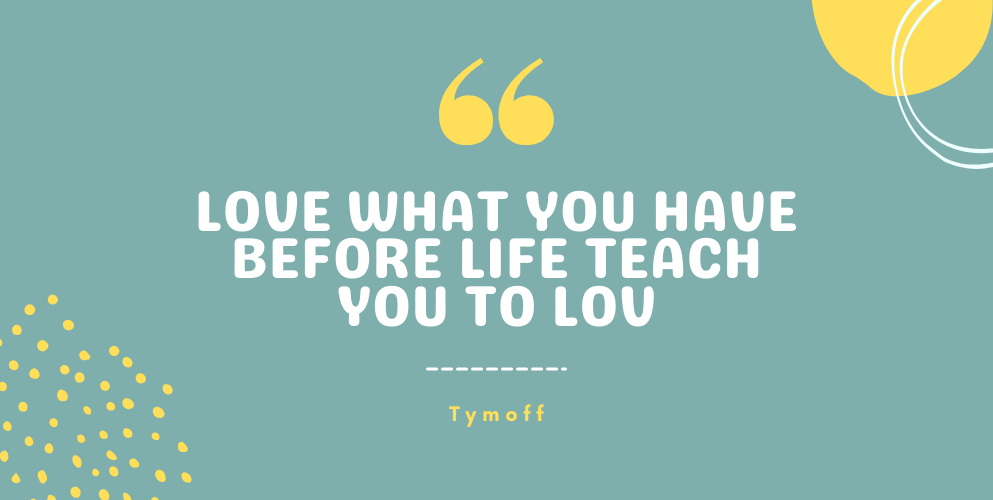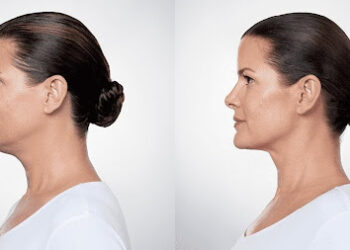Love What You Have, Before Life Teaches You to Lov – Tymoff
You may have heard this famous “Quote” in your life at least once.
What is Love What You Have Before Life Teaches You to Lov – Tymoff
“Love what you have, before life teaches you to lose it” serves as a timely reminder that happiness lies outside material goods and material pursuits. Embark upon a path toward gratefulness and contentment by prioritizing relationships over possessions.
Appreciate what you have

“Love What You Have, Before Life Teaches You to Lov – Tymoff” can be an important reminder that happiness doesn’t always stem from having more. Appreciating what we already have may simply involve pausing to notice the beauty in our surroundings or smiling at a friend.
By actively showing gratitude for what you already have, the more you’ll appreciate all you have. Being thankful can lead to contentment and help reduce regrets in future years.
Appreciating what’s around us may not always be easy, but it is definitely worth the effort.
Start by compiling a list of things for which you are thankful and then challenge yourself to find at least one thing to appreciate each day – whether that be someone’s smile, coffee or simply feeling supported when walking.
One way to demonstrate gratitude is through giving back. Helping others and demonstrating your value of what they possess can go a long way toward showing yours that their lives matter just as much to you.
By sharing what you have, you can help others discover joy just like what has brought happiness into your own life.
Remembering the fleeting nature of all things is essential, from your body and relationships to material possessions you own. Natural disaster victims or those afflicted by cancer are frequently reminded of this truth.
When feeling jealous of a friend’s Mustang, ask yourself whether the hassle or expense involved with owning one is really worth the trade-offs involved in owning it. Chances are the answer will likely be “No”.
Practice gratitude

Practicing gratitude is an effective tool that can enhance our physical, mental, emotional, and social well-being.
Gratitude helps cultivate mindfulness, develop stress management skills, and deepen our relationships.
Plus it makes life seem brighter! There are multiple ways you can express your appreciation – the best part is that it doesn’t have to become an obligation or chore!
Some effective techniques to help express our gratitude include writing in a journal (check out our gratitude journals!), sharing what you are thankful for with friends, or creating an art project.
You could also choose to vary the focus each week: for instance, counting blessings related to supportive relationships and work life or physical surroundings and past events could all be counted among the various contexts where blessings might manifest themselves.
Slowing down and taking notice of small details is another effective way to show our appreciation.
Take some time each day to notice all that surrounds you – sunlight filtering through windows, laughter in the background or the scent of homemade dishes are just some examples – as though experiencing them for the first time.
Focus your mind and body fully on these experiences like they were all brand new to you.
An effective way to express gratitude is through writing letters of thanks.
Whether this be email or letter form, get as specific as possible when expressing why and how this person or thing enriches your life – and be sure to proofread before hitting send or dropping it in the mailbox!
Keep gratitude in mind as a positive emotion; its effects can help offset life’s difficulties with its positive energy.
Studies show that being grateful makes people more resilient during difficult times; learning to appreciate what you already have is not giving up your dreams, but rather an acknowledgment that life’s experiences make each day precious and unique.
Take time off from the pursuit of more

Breaking free from the pursuit of more allows you to slow down and appreciate life’s simple pleasures, as well as focus on what truly matters, such as meaningful relationships.
In an often materialistic society, happiness doesn’t come from external sources but from within yourself; practicing contentment, appreciating what you already have, and cultivating gratitude will help you love what is already within reach before life teaches you how to love less of what exists around you.
Though difficult at first, with practice you will discover it is well worth your while – happy living!
What are the best ways to enhance your mood? Share them in the comments below!
Let go of expectations.
If you find it difficult to appreciate what you already have and always seek more, it may be time to adjust your expectations.
While this can be challenging to do, this is key to achieving happiness and contentment; expectations create false hope of what might turn out differently; goals allow us to work toward them and change as needed; it is easy to misinterpret one for another; just remember that expectations cannot be controlled and often be dashed when things don’t turn out as planned.
Expectations can be one of the major causes of disappointment and stress in life. When someone fails to live up to your expectations in any given area, and you have an immediate reaction such as anger or sadness, it takes away from your ability to enjoy and appreciate being present and enjoying what’s happening right then – not to mention creating extra drama and tension that ultimately impacts both parties in a relationship.
Letting go of unrealistic expectations can be challenging, yet one of the most rewarding steps you take for yourself and your relationship.
By relaxing expectations you’ll become more open to enjoying what is currently happening instead of dwelling on what might have been.
Stop blaming others for not meeting your expectations. This can be challenging since other people such as your parents often influence how we view the world, so having an open dialogue with these individuals to explain that while they cannot change who you are they must attempt to understand your decisions.
Letting go of expectations means accepting that life will always throw unexpected events your way and it is wise not to put too much stock in them.
If you find it difficult to let go, therapy may help develop realistic goals while teaching you how to manage societal or parental expectations in a healthy manner.
4 Reasons Why “Love What You Have, Before Life Teaches You to Lov – Tymoff” is the Best Quote
- It encourages people to be satisfied with what they have.
- Encourages people to be grateful for what they have.
- Encourages people to take time off from the relentless pursuit of more.
- It Encourages people to be present in their lives.
Conclusion
Tymoff’s book, Appreciate What You Have Before Life Teaches You to Lov – Tymoff is about appreciating what is already present in your life and appreciating its significance to happiness, meaning, and purpose. Gratitude, mindfulness, and shifting perspectives are three essential ingredients necessary for a true appreciation of belongings and enjoying present-moment experiences.
Frequently Asked Questions
1. What does “Love What You Have, Before Life Teaches You to Lov – Tymoff” mean?
It means valuing and appreciating what you have in life before you learn it the hard way through difficult experiences.
2. Why is it important to appreciate what we have?
Appreciating what we have leads to contentment and happiness, and helps us avoid future regrets.
3. What’s the difference between appreciating what you have and constantly wanting more?
Appreciating what you have brings contentment while wanting more can lead to dissatisfaction and stress.
4. How can I live by the philosophy “Love What You Have, Before Life Teaches You to Lov – Tymoff ”?
Embrace gratitude, cherish the present, and value what you have now to lead a happier and more fulfilling life.







